By: Robert Michael Ballantyne (1825-1894) |
|---|
 Lost in the Forest Wandering Will's Adventures in South America
Lost in the Forest Wandering Will's Adventures in South America
|
 Gascoyne, the Sandal-Wood Trader
Gascoyne, the Sandal-Wood Trader
|
 Over the Rocky Mountains Wandering Will in the Land of the Redskin
Over the Rocky Mountains Wandering Will in the Land of the Redskin
|
|
|
 Post Haste
Post Haste
In this book, Ballantyne weaves the story of Phillip Mayland and his friend, George Aspel with an interesting portrayal of the British Post Office as it existed in the 19th century. In the words of R. M. Ballantyne himself: "This tale is founded chiefly on facts furnished by the Postmaster-General’s Annual Reports, and gathered, during personal intercourse and investigation, at the General Post-Office of London and its Branches.
It is intended to illustrate—not by any means to exhaust—the subject of postal work, communication, and incident throughout the Kingdom...
|
 Rivers of Ice
Rivers of Ice
|
 The Coxswain's Bride also, Jack Frost and Sons; and, A Double Rescue
The Coxswain's Bride also, Jack Frost and Sons; and, A Double Rescue
|
 The Floating Light of the Goodwin Sands
The Floating Light of the Goodwin Sands
|
 The Life of a Ship
The Life of a Ship
|
 Life in the Red Brigade London Fire Brigade
Life in the Red Brigade London Fire Brigade
|
 Silver Lake
Silver Lake
|
 Hunting the Lions
Hunting the Lions
|
 Island Queen
Island Queen
The story of Dominic, Otto and Pauline Rigonda, three siblings who are blown onto an island after being shipwrecked, and are later joined by the immigrant passengers and crew of a ship that is wrecked on the same island. When the question of government comes up, the little colony chooses a queen, and they work on improving the island for some time, despite internal dissensions, and an attack by savages. But eventually the colony encounters natural forces it cannot resist, and the queen and her family return to England, hopefully to live "happily ever after".
|
 Fighting the Whales
Fighting the Whales
|
 The Thorogood Family
The Thorogood Family
|
 The Settler and the Savage
The Settler and the Savage
|
 The Lighthouse
The Lighthouse
|
 The Young Fur Traders
The Young Fur Traders
|
 Red Rooney The Last of the Crew
Red Rooney The Last of the Crew
|
 Jarwin and Cuffy
Jarwin and Cuffy
Jarwin is an English sailor who has been shipwrecked. He is stranded on a raft with only his dog Cuffy, and land is nowhere in sight. Their food and water is running out. What can Jarwin do to save his dog's (and his own) life?
|
 The Hot Swamp
The Hot Swamp
|
 The Crew of the Water Wagtail
The Crew of the Water Wagtail
|
 The Young Trawler
The Young Trawler
|
 Erling the Bold
Erling the Bold
|
 Chasing the Sun
Chasing the Sun
|
 Blown to Bits The Lonely Man of Rakata, the Malay Archipelago
Blown to Bits The Lonely Man of Rakata, the Malay Archipelago
|
 The Red Man's Revenge A Tale of The Red River Flood
The Red Man's Revenge A Tale of The Red River Flood
|
 The World of Ice
The World of Ice
|
 Fighting the Flames
Fighting the Flames
|
 Shifting Winds A Tough Yarn
Shifting Winds A Tough Yarn
|
 Hunted and Harried
Hunted and Harried
|
 The Battle and the Breeze
The Battle and the Breeze
|
 Fort Desolation Red Indians and Fur Traders of Rupert's Land
Fort Desolation Red Indians and Fur Traders of Rupert's Land
|
 Martin Rattler
Martin Rattler
|
 Sunk at Sea
Sunk at Sea
|
 Wrecked but not Ruined
Wrecked but not Ruined
|
 Martin Rattler
Martin Rattler
|
 Fighting the Whales
Fighting the Whales
|
 Saved by the Lifeboat
Saved by the Lifeboat
|
 Twice Bought
Twice Bought
This story is set in the gold fields of Oregon, where Tom Brixton, and his best friend, Fred Westly, are digging gold to try to “make their pile”. Before leaving England, the steady and God-fearing Fred had promised Tom's mother that he would do his best to take care of his friend, but in spite of all his efforts, Tom had fallen in with bad companions and taken to gambling. He was convinced that he could make his fortune quicker by attempting to increase it at the dice or card table, and all his friend's attempts to make him see his errors were unavailing...
|
 The Story of the Rock
The Story of the Rock
|
 Jeff Benson, or the Young Coastguardsman
Jeff Benson, or the Young Coastguardsman
|
 The Lighthouse
The Lighthouse
|
 The Wild Man of the West A Tale of the Rocky Mountains
The Wild Man of the West A Tale of the Rocky Mountains
|
By: Rudyard Kipling (1865-1936) |
|---|
 Kim
Kim
Present day readers live in a world that's emerged from the Cold War and the endless rivalry of the Super Powers but this book goes back and traces the origins of the conflict and mutual antagonism between nations.
Kim by Rudyard Kipling is set against the background of the Great Game as it was called the tug-of-war between Britain and Russia for the control of Central Asia. The novel's action takes place during the Anglo-Afghan Wars of 1839-42. The novel's sweeping narrative, the depth of character and the sheer historical scale make it a first rate story...
|
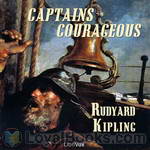 Captains Courageous
Captains Courageous
Real men don’t take guff from snotty kids. Neither does Disko Troop, skipper of the “We’re Here”, a fishing schooner out of Gloucester, Massachusetts, when his crew fishes Harvey Cheyne out of the Atlantic. There’s no place on the Grand Banks for bystanders, so Harvey is press-ganged into service as a replacement for a man lost overboard and drowned. Harvey is heir to a vast fortune, but his rescuers believe none of what he tells them of his background. Disko won’t take the boat to port until it is full of fish, so Harvey must settle in for a season at sea...
|
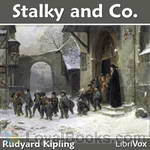 Stalky and Co.
Stalky and Co.
Rudyard Kipling published Stalky & Co. in 1899. Set at an English boarding school in a seaside town on the North Devon coast. (The town, Westward Ho!, is not only unusual in having an exclamation mark, but also in being itself named after a novel, by Charles Kingsley.) The book is a collection of linked short stories, with some information about the eponymous Stalky’s later life. Beetle, one of the main trio, is said to be based on Kipling himself, while Stalky may be based on Lionel Dunsterville...
|
 Lost in the Forest Wandering Will's Adventures in South America
Lost in the Forest Wandering Will's Adventures in South America
 Gascoyne, the Sandal-Wood Trader
Gascoyne, the Sandal-Wood Trader
 Over the Rocky Mountains Wandering Will in the Land of the Redskin
Over the Rocky Mountains Wandering Will in the Land of the Redskin
 Post Haste
Post Haste
 Rivers of Ice
Rivers of Ice
 The Coxswain's Bride also, Jack Frost and Sons; and, A Double Rescue
The Coxswain's Bride also, Jack Frost and Sons; and, A Double Rescue
 The Floating Light of the Goodwin Sands
The Floating Light of the Goodwin Sands
 The Life of a Ship
The Life of a Ship
 Life in the Red Brigade London Fire Brigade
Life in the Red Brigade London Fire Brigade
 Silver Lake
Silver Lake
 Hunting the Lions
Hunting the Lions
 Island Queen
Island Queen
 Fighting the Whales
Fighting the Whales
 The Thorogood Family
The Thorogood Family
 The Settler and the Savage
The Settler and the Savage
 The Lighthouse
The Lighthouse
 The Young Fur Traders
The Young Fur Traders
 Red Rooney The Last of the Crew
Red Rooney The Last of the Crew
 Jarwin and Cuffy
Jarwin and Cuffy
 The Hot Swamp
The Hot Swamp
 The Crew of the Water Wagtail
The Crew of the Water Wagtail
 The Young Trawler
The Young Trawler
 Erling the Bold
Erling the Bold
 Chasing the Sun
Chasing the Sun
 Blown to Bits The Lonely Man of Rakata, the Malay Archipelago
Blown to Bits The Lonely Man of Rakata, the Malay Archipelago
 The Red Man's Revenge A Tale of The Red River Flood
The Red Man's Revenge A Tale of The Red River Flood
 The World of Ice
The World of Ice
 Fighting the Flames
Fighting the Flames
 Shifting Winds A Tough Yarn
Shifting Winds A Tough Yarn
 Hunted and Harried
Hunted and Harried
 The Battle and the Breeze
The Battle and the Breeze
 Fort Desolation Red Indians and Fur Traders of Rupert's Land
Fort Desolation Red Indians and Fur Traders of Rupert's Land
 Martin Rattler
Martin Rattler
 Sunk at Sea
Sunk at Sea
 Wrecked but not Ruined
Wrecked but not Ruined
 Martin Rattler
Martin Rattler
 Fighting the Whales
Fighting the Whales
 Saved by the Lifeboat
Saved by the Lifeboat
 Twice Bought
Twice Bought
 The Story of the Rock
The Story of the Rock
 Jeff Benson, or the Young Coastguardsman
Jeff Benson, or the Young Coastguardsman
 The Lighthouse
The Lighthouse
 The Wild Man of the West A Tale of the Rocky Mountains
The Wild Man of the West A Tale of the Rocky Mountains
 The Prophet of Berkeley Square
The Prophet of Berkeley Square
 The Good Ship Rover
The Good Ship Rover
 Terry Or, She ought to have been a Boy
Terry Or, She ought to have been a Boy
 Go Ahead Boys and the Racing Motorboat
Go Ahead Boys and the Racing Motorboat
 Andy at Yale Or, The Great Quadrangle Mystery
Andy at Yale Or, The Great Quadrangle Mystery
 Little White Fox and his Arctic Friends
Little White Fox and his Arctic Friends
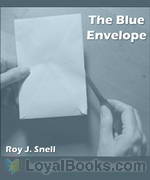 The Blue Envelope
The Blue Envelope
 Under the Ocean to the South Pole Or, the Strange Cruise of the Submarine Wonder
Under the Ocean to the South Pole Or, the Strange Cruise of the Submarine Wonder
 The Wizard of the Sea A Trip Under the Ocean
The Wizard of the Sea A Trip Under the Ocean
 Kim
Kim
 Captains Courageous
Captains Courageous
 Stalky and Co.
Stalky and Co.
 The Rival Campers Ashore The Mystery of the Mill
The Rival Campers Ashore The Mystery of the Mill
 At the Little Brown House
At the Little Brown House
 The Lilac Lady
The Lilac Lady
 Tabitha at Ivy Hall
Tabitha at Ivy Hall
 Tabitha's Vacation
Tabitha's Vacation
 Tattine
Tattine
 Radio Boys Loyalty Or, Bill Brown Listens In
Radio Boys Loyalty Or, Bill Brown Listens In
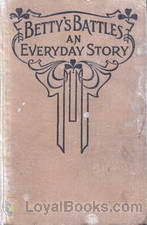 Betty's Battles an Everyday Story
Betty's Battles an Everyday Story
 Frank of Freedom Hill
Frank of Freedom Hill
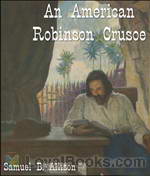 An American Robinson Crusoe
An American Robinson Crusoe
 Hazel Squirrel and Other Stories
Hazel Squirrel and Other Stories
 Miss Muffet's Christmas Party
Miss Muffet's Christmas Party
 The Rocky Island and Other Similitudes
The Rocky Island and Other Similitudes
 Ted and the Telephone
Ted and the Telephone
 Walter and the Wireless
Walter and the Wireless
 Carl and the Cotton Gin
Carl and the Cotton Gin
 Watch—Work—Wait Or, The Orphan's Victory
Watch—Work—Wait Or, The Orphan's Victory
 Betty Leicester A Story For Girls
Betty Leicester A Story For Girls
 Little Tora, The Swedish Schoolmistress and Other Stories
Little Tora, The Swedish Schoolmistress and Other Stories
 The Golden House
The Golden House
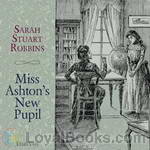 Miss Ashton's New Pupil
Miss Ashton's New Pupil
 Girlhood and Womanhood The Story of some Fortunes and Misfortunes
Girlhood and Womanhood The Story of some Fortunes and Misfortunes
 Fanny, the Flower-Girl, or, Honesty Rewarded
Fanny, the Flower-Girl, or, Honesty Rewarded
 Five Little Friends
Five Little Friends
 The Boys of Crawford's Basin The Story of a Mountain Ranch in the Early Days of Colorado
The Boys of Crawford's Basin The Story of a Mountain Ranch in the Early Days of Colorado
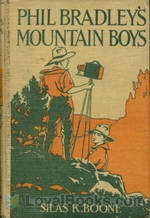 Phil Bradley's Mountain Boys The Birch Bark Lodge
Phil Bradley's Mountain Boys The Birch Bark Lodge
 Sonny Boy
Sonny Boy
 Boy Scouts First Camp Fire
Boy Scouts First Camp Fire